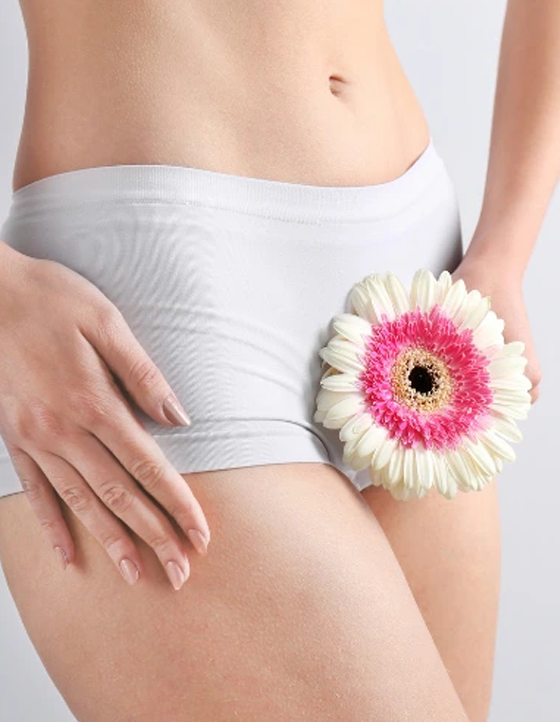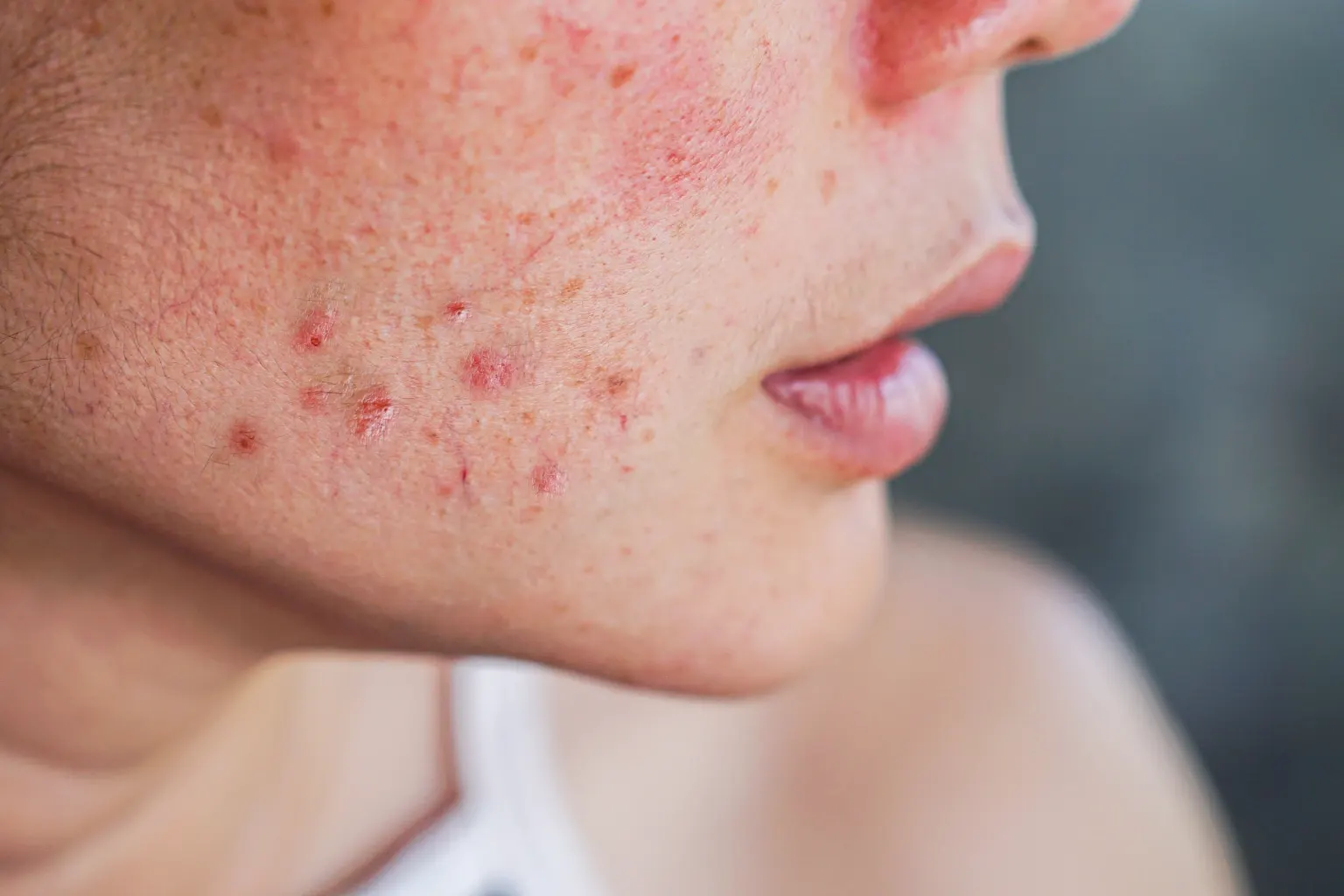
Stress isn’t a direct cause of acne, but it can worsen the acne you already have. When you’re stressed, your body releases cortisol, a hormone that boosts oil production in your skin. This extra oil can block pores, leading to more breakouts.
Additionally, stress can lead to poor habits like touching your face or skipping your skincare routine, making acne worse. In this blog, we’ll explore how stress and acne are connected, where stress pimples tend to occur, and how you can manage both stress and acne effectively.
Understanding the Root Causes of Acne
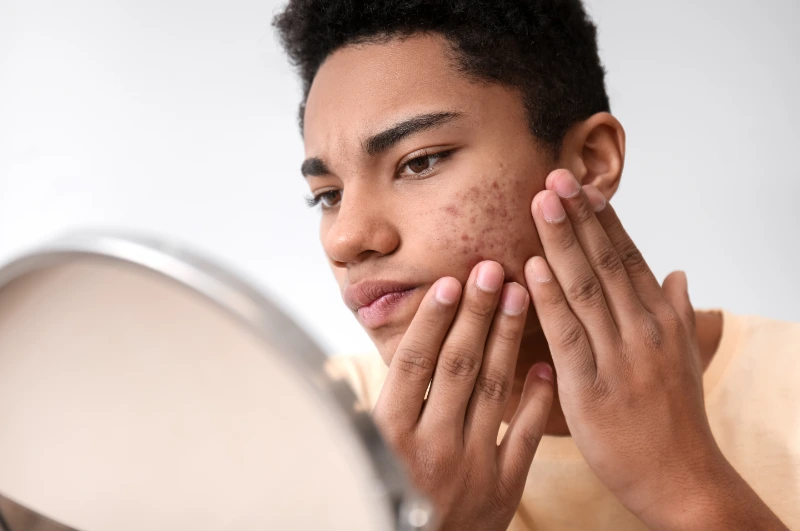
Acne occurs when sebaceous oil glands in the hair follicles become clogged with dead skin cells and excess oils. This buildup creates the perfect environment for bacteria to grow, leading to breakouts. Hormonal changes, especially androgen hormones, increase oil production, making the skin more prone to acne.
While acne is often considered a teenagers’ problem, it can extend into adulthood. Stress plays a role in worsening acne-prone skin, especially in adults. Genetics also contribute to acne, meaning if your family has a history of breakouts, you’re more likely to experience them too.
Acne varies from mild to severe acne, with some people only getting the occasional pimple, while others suffer from painful cysts. While there isn’t one exact cause for acne, understanding the triggers can help you manage and treat it effectively.

The Connection Between Stress and Acne: How Does Stress Cause Pimples?
When you’re under stress, your body releases hormones like cortisol. These stress-related hormones increase oil production in your sebaceous glands, making your skin more prone to breakouts. While stress doesn’t directly cause acne, it can make existing acne lesions much worse.
The connection between stress and acne is particularly noticeable in young adults. Stress leads to changes in your skin’s oil production, which can clog pores and cause pimples. This is why many people experience stress pimples on face, especially on the forehead and chin.
The signs of stress acne include more frequent breakouts and more severe flare-ups during stressful times. These stress breakouts may appear as red, inflamed pimples that take longer to heal. If you already struggle with acne, stress can make it harder to manage.
In short, while stress isn’t the root cause, it definitely worsens stress and pimples by increasing oil production and inflammation. Managing stress is a crucial part of controlling stress-related acne and preventing future breakouts.
Where Do Stress Pimples Occur? Common Stress Acne Areas
Stress pimples often appear in specific areas of the face. The most common places for stress acne are the cheeks, chin, and the T-zone (forehead, nose, and chin). These areas have a higher concentration of sebaceous glands, which produce more oil during stressful times.
The jawline and chin are particularly prone to stress breakouts, as hormonal imbalances can trigger pimples in these zones.
Here’s where stress acne is located most often:
- Cheeks: Breakouts on the cheeks are common during stress, especially if you’re prone to touching your face.
- Chin and jawline: Hormonal shifts during stress cause pimples in these areas.
- T-zone: Stress increases oil production in the forehead, nose, and chin, leading to clogged pores and breakouts.
So, where do you get pimples from stress? Typically, they show up in oily areas of your face. Managing oil production and stress is key to controlling these breakouts.
Effective Acne Stress Control
Managing stress is key to controlling stress breakouts and reducing the severity of acne. Stress causes hormone imbalances that trigger acne outbreaks, but with the right approach, you can minimize the damage.
How do you get rid of stress pimples?
- Practice relaxation techniques: Try meditation, deep breathing, or yoga to reduce stress. Exercise is another effective way to control stress levels.
- Use the right skincare products: Prescription acne treatments like benzoyl peroxide can reduce inflammation and clear pimples. Always consult a dermatologist for severe cases.
- Consider natural remedies: Aloe vera, tea tree oil, and honey are natural treatments that can help soothe the skin and reduce redness.
- Get professional help: An experienced dermatologist can offer personalized solutions, including prescription treatments and certain medications for more severe cases.
- Adopt a healthy lifestyle: A balanced diet, proper sleep, and regular hydration can support your skin’s health and make stress less harmful.
How long does it take for stress acne to go away? It depends on the severity, but with consistent care, most stress-related pimples will start to heal within a few days to a week. However, addressing stress and using the right treatments can prevent future small dark spots and long-lasting blemishes.
“Stress doesn’t cause acne, but it can certainly make it worse. Managing stress effectively is key to clearer skin.” – Dr. John Minni, Dermatologist
What Foods to Avoid if You Have Stress Acne and the Best Diet for Healthy Skin
Your diet plays a big role in managing stress acne. Certain foods can increase inflammation and make breakouts worse. Avoid sugary snacks, processed foods, and refined carbs like white bread, pastries, and soda. These foods spike insulin levels, leading to more oil production and clogged pores.
So, what diet is good for stress acne? Here are some foods to include:
- Fruits and vegetables: Rich in antioxidants, these help reduce inflammation and promote clear skin.
- Omega-3 fatty acids: Found in fish like salmon, chia seeds, and walnuts, these reduce inflammation and support skin health.
- Whole grains and legumes: These keep blood sugar stable and prevent spikes that can trigger breakouts.
- Water-rich foods: Staying hydrated with foods like cucumber and watermelon helps flush toxins from your skin.
By focusing on these foods for stress acne, you can improve your skin’s appearance and reduce the impact of stress-related breakouts.
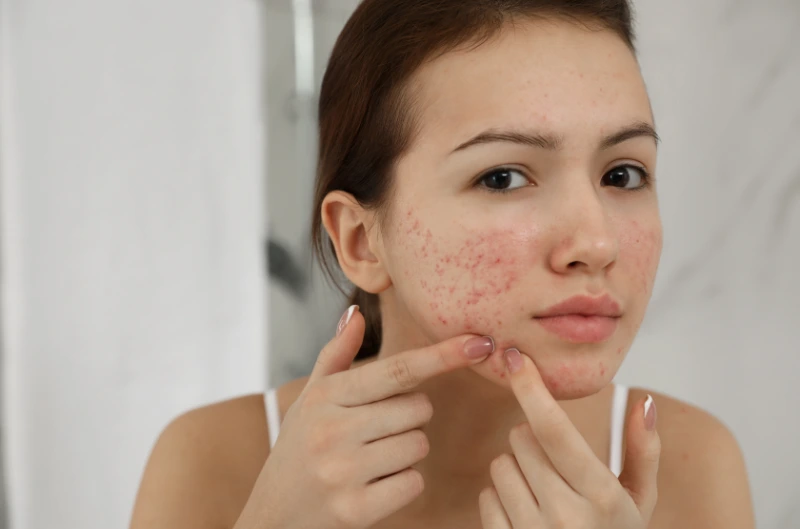
How Long Does It Take for Stress Acne to Go Away?

It depends on your skin type and stress levels. For some, stress breakouts clear up within a few days, especially with proper treatment and stress management. However, in more severe cases, it might take a week or longer.
Consistent skincare routines, stress reduction, and targeted acne treatments can speed up recovery. If breakouts persist, consulting a dermatologist is the best option to ensure faster healing and prevent future flare-ups.
Managing Stress for Clearer Skin: Techniques That Help
Managing stress is crucial for maintaining clear skin and preventing stress breakouts. When stress is reduced, your skin produces less oil, leading to fewer breakouts. Incorporating simple stress-relief techniques into your routine can make a big difference.
Here are some effective methods:
- Deep breathing: Practicing deep, mindful breathing can instantly reduce anxiety and lower stress hormones.
- Yoga: Regular yoga not only relaxes your mind but also improves circulation, which promotes healthy skin.
- Good sleep habits: Aiming for 7-9 hours of quality sleep helps your body repair itself, reducing acne outbreaks.
If stress feels overwhelming, seeking professional help through therapy can be beneficial. A therapist can help you manage stress and prevent stress-related acne by offering tools to cope with anxiety and emotional stress.
FAQs:
Can you get pimples from stress?
Yes, stress can worsen existing acne by increasing oil production, which leads to more frequent pimples.
Why does stress cause pimples?
Stress triggers the release of hormones like cortisol, which stimulates the sebaceous glands to produce more oil.
Can stress make you break out?
Absolutely. Emotional stress can increase both the severity and frequency of acne breakouts.
Does stress cause pimples on chin?
Yes, stress pimples commonly appear on the chin and jawline due to hormonal imbalances.
Why does stress cause breakouts?
Hormones released during stress cause oil production to rise, clogging pores and leading to breakouts.
Final Thoughts: Managing Stress to Keep Acne Under Control
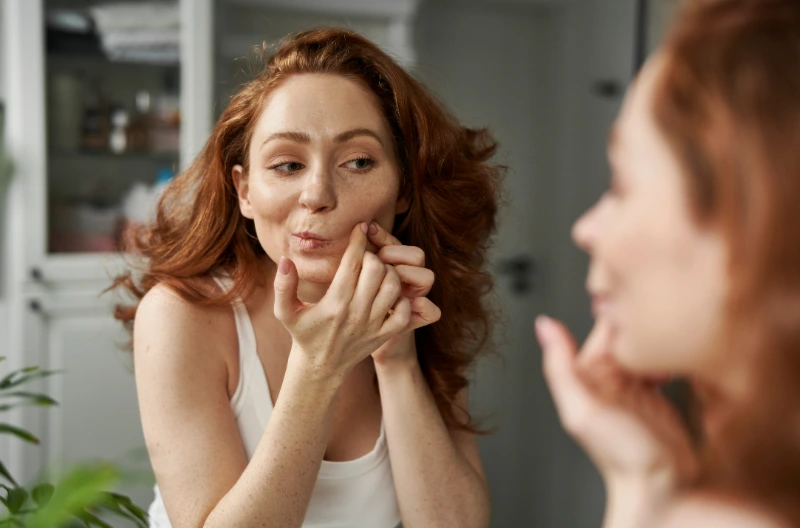
Managing stress and following a consistent skincare routine are key to keeping acne under control. While stress doesn’t directly cause acne, it can worsen breakouts by increasing oil production. If you’re struggling with persistent acne, it’s important to consult a dermatologist for personalized advice and effective acne treatment options.
For professional help, visit Spade Skin Care Acne Program to explore treatments tailored to your skin’s needs. Taking action early can prevent future breakouts and promote healthier skin.



